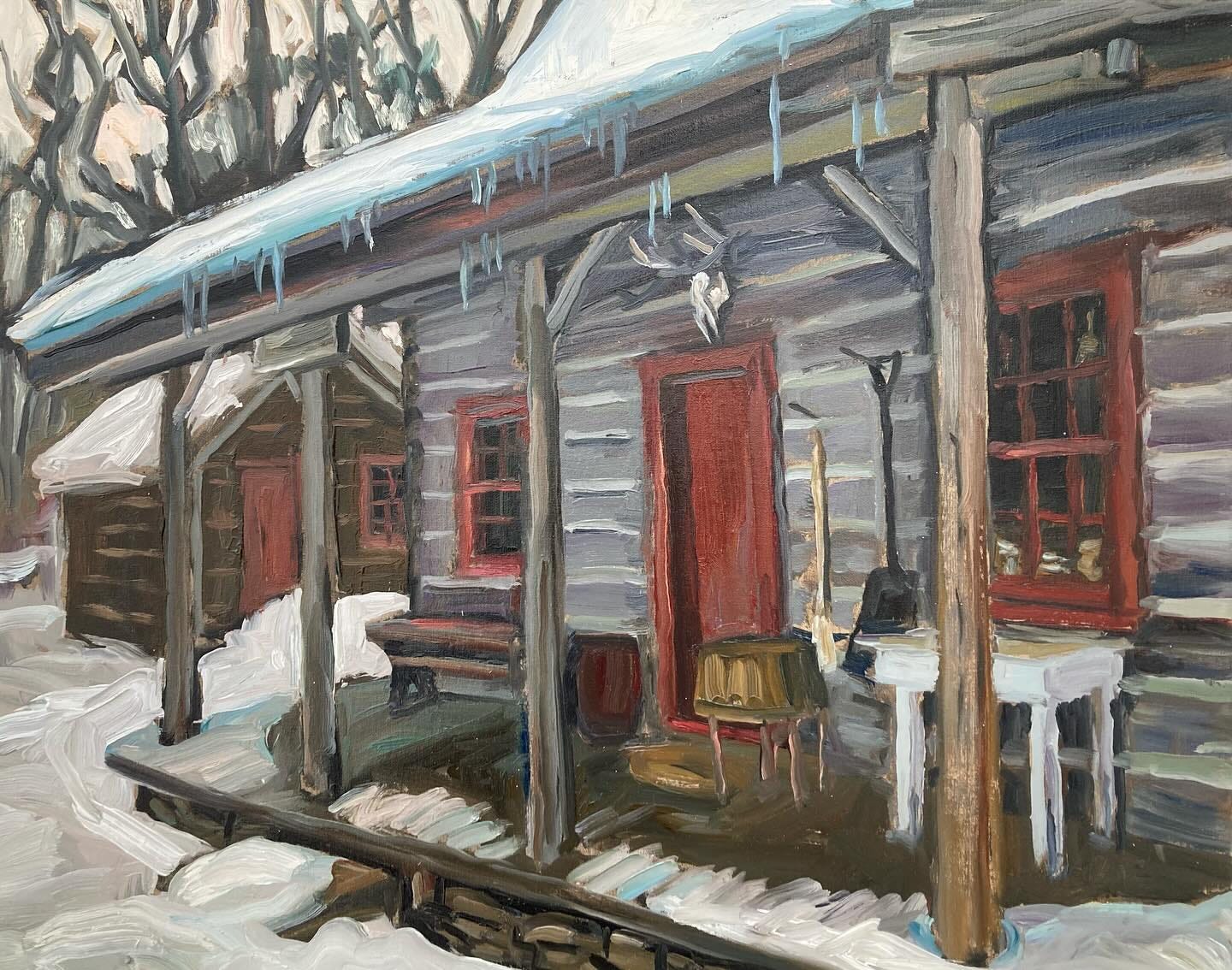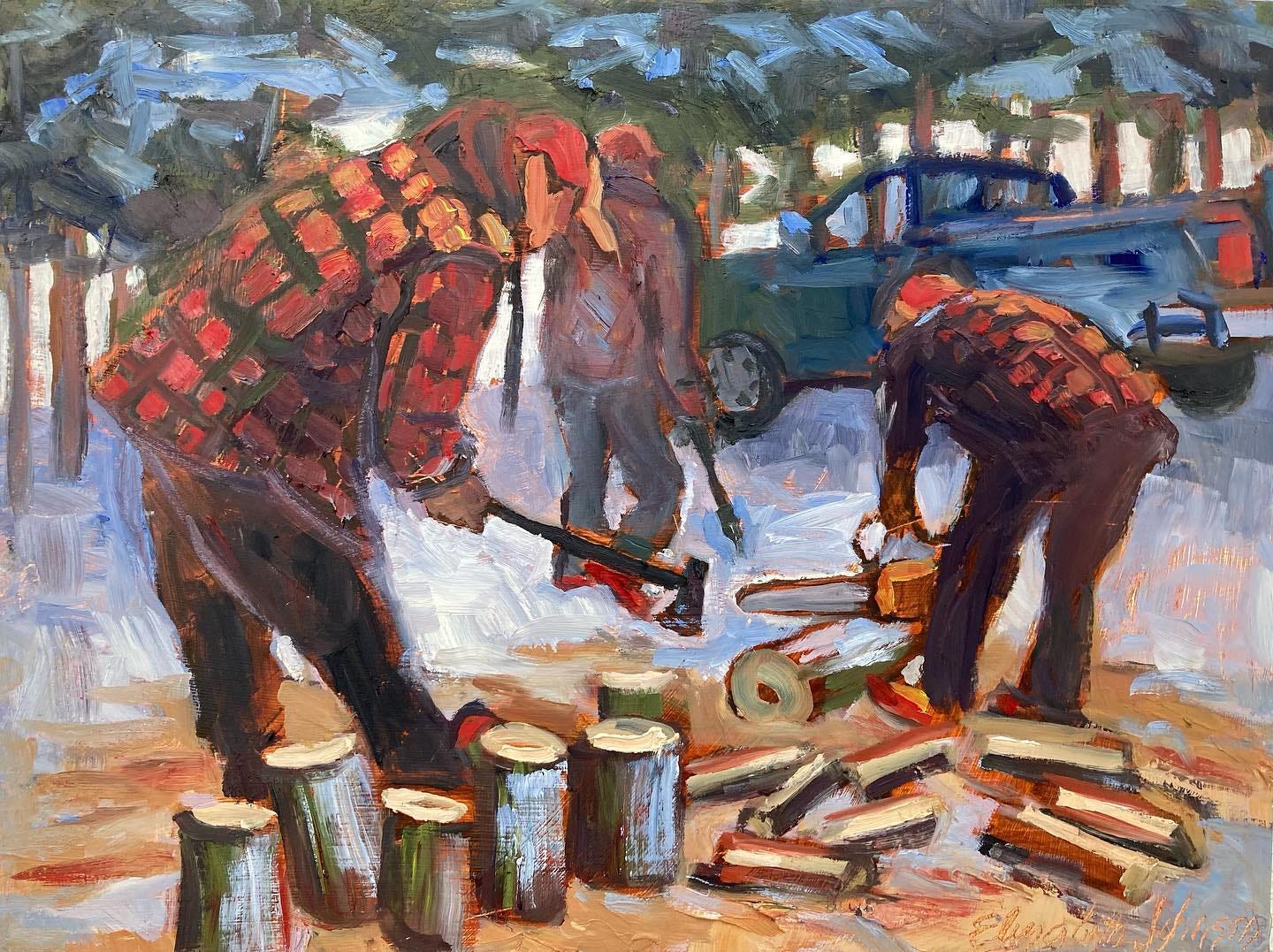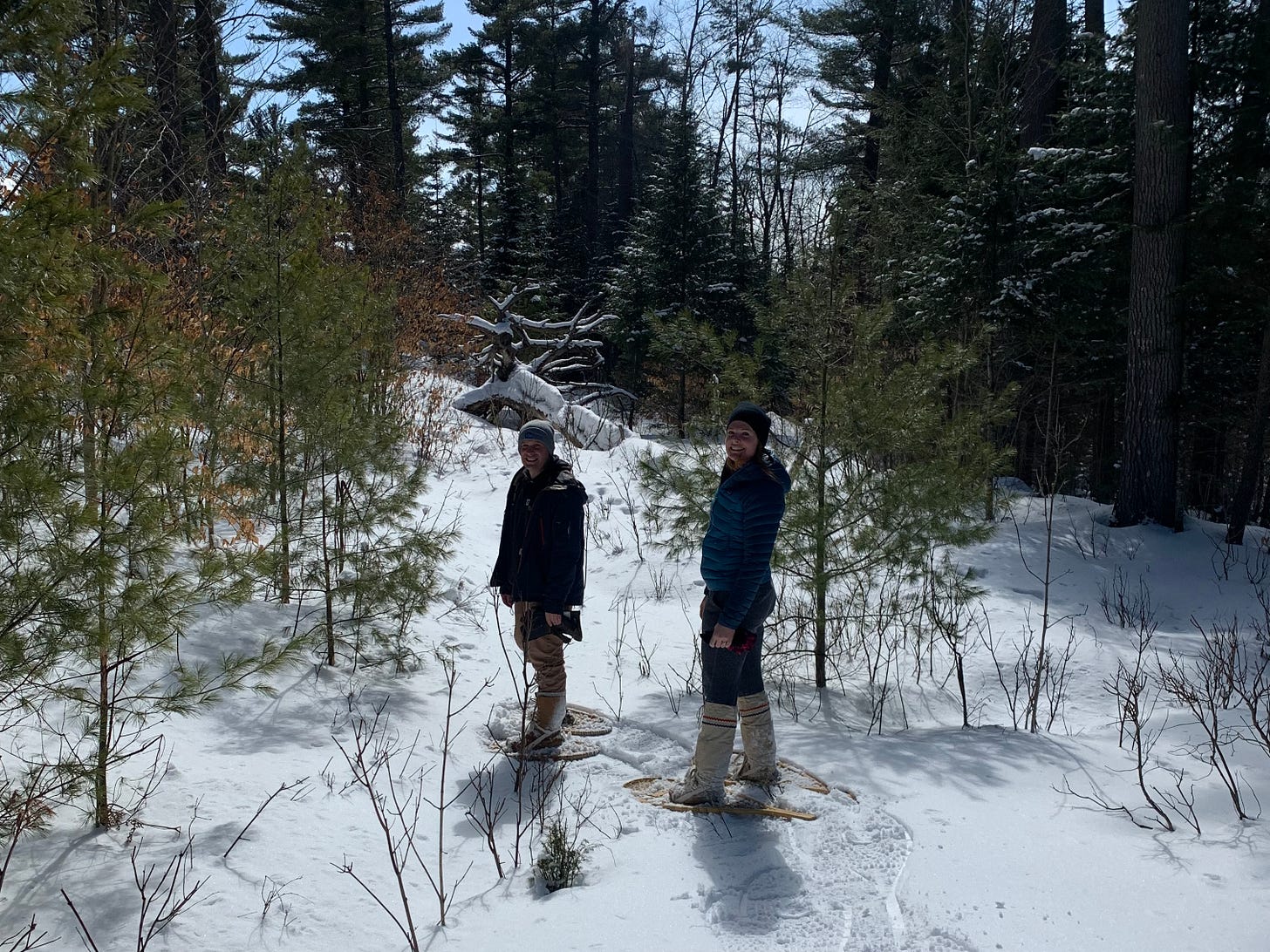A Defense of Rural Dwellers
As Barbara Kingsolver said, "We are the last demographic that progressive people still mock with impunity."

I grew up in a small wooden house, hand-built by my father, on the edge of a lake near Algonquin Park, in Ontario, Canada. I lived there with my parents and my three siblings (and a wood-burning cookstove named Raven). We were the only year-round residents on the lake, which meant that, at the end of each summer, the other cottagers would return to their homes in Toronto, and we remained in splendid isolation until the following summer.
I attended a three-room school in a nearby village until grade six, at which point my mom chose to homeschool us. She was fed up with multiple grades all crammed into a single room, taught by a frazzled teacher, and figured she could do a better job. My parents repurposed a cabin on their property to become a schoolhouse, and my siblings and I studied there for five years.
Growing up, I felt intensely connected to my natural surroundings. I knew every tree, rock, and bird’s nest on our property, and far beyond. Most days I would go out roaming for an hour or two. In summer, I paddled my kayak around the lake, following every bend of the shoreline. In winter, I snowshoed deep into the forest to visit beautiful frozen swamps that were inaccessible at any other time of year; I wasn’t afraid of getting lost because I could follow my trail home. I wandered large areas of forest and knew them like the back of my hand. I felt familiarity with certain stumps and angled trees and land formations. Over the years, a map of belonging formed in my mind.
There was little to distract me from my environment. We only left the lake once a week for music lessons and groceries. We had no TV or Internet, so when reading books, doing crafts, and playing with my dollhouse got boring, there was nowhere to go but out. The lake and the forest were both my playground and my playmates. I grew up with a keen sense of attunement to the forest and always anticipated signs of seasonal change, like ice forming in early winter, maple sap running and spring peepers singing as the weather warmed, the haunting call of loons in summer, and the first turning of leaves from green to blazing red in fall. I had special “sit spots” on rocks and under trees where I went to read, nap, and daydream.
My parents loved living on a lake in the forest. They’d given up dissatisfying professional careers in the city to move there, and every day they acted as if they’d made the greatest decision of their lives. Their enthusiasm rubbed off me, and I grew up feeling as though I’d won the geographical lottery.
Urban Scorn
But over time, I realized other people didn’t view it that way. As I grew up, I sensed a disparaging attitude toward the fact that I’d grown up in such a remote setting. Pointed comments like, “I could never do that, I’d go crazy,” and “Did you have any friends?” and “That must have been so boring; what did you do all day?” and even “I feel so sorry for you,” revealed that people pitied me for living where I did—or at the very least, felt I’d missed out on key childhood experiences.
An older urban friend once said, “It’s amazing your parents did such a good job raising you, living where they did,” as if this were surprising based on our location. She didn’t mean to sound critical, but I was surprised by the implicit judgment.
Over time, I realized that a sharp divide exists between urban and rural dwellers; and while that divide may be perpetuated to some extent by both sides, I do think that a disproportionate amount of condescension is reserved for rural dwellers.
This is largely reinforced by cultural narratives and the media. But I think it’s also caused by the fact that most rural dwellers have spent some time in a city at one point in their lives, whether for school or work, and have chosen to leave it; whereas most urban dwellers have never left the city to live remotely for several years at a time, so they can’t understand its appeal. In other words, one side understands the other a whole lot more than the other understands them.
As I see it, the main qualities of a rural life include access to staggering natural beauty and an abundance of solitude. The main qualities of an urban life include stimulating socialization and access to culture in the form of museums, art galleries, concerts, and restaurants. All are wonderful things, but for some reason, our society has decided that the former (nature + solitude) are desirable only in small quantities, i.e., a cottage weekend or a retreat, and the latter (sociality + culture) matters more on an everyday basis. Someone who chooses to opt out of cultural and social events to live in the wilderness is often portrayed as checking out, giving up, withdrawing from society—or, in the case of my parents, depriving their child of a “normal” childhood.
As I got older, I started to resent how rural people were portrayed in movies and TV shows. They’re always the idiots, the butt of the joke. They get derogatory labels like “redneck”, “hick”, “boor”, and even “deplorable.” Storylines show rural people as the dumb, clueless, socially inept ones (the “bumbling fool”), while city folks are the suave, brilliant, well-connected, successful ones who save the day.
My nagging sentiments about this were validated by a recent interview that rural Appalachia-dwelling author Barbara Kingsolver did after the publication of her Pulitzer Prize-winning book, Demon Copperhead (which gutted me in the best possible sense; please read it). She told an interviewer:
“The news, the movies, TV, it’s all manufactured in cities about city people. We’re nothing. We don’t see ourselves at all. And if we do show up, it’s as a joke, the hillbillies. We are the last demographic that progressive people still mock with impunity.”
This bothers me because there is nothing inherently dumb about rural people.
Practical and Thoughtful
It is true that rural people usually don’t wear fancy clothes and many don’t drive nice cars, but that is because they live intensely embodied lives and do jobs that require getting dirty, like hauling and chopping firewood, bailing boats, fixing greasy snowmobiles and damaged outboard motor props, rebuilding docks dislodged by the ice going out in April, and shoveling snow off neighbours’ roofs to ensure they don’t collapse.
The rural people I know are confident because they can solve problems on their own. They embody the essence of making do. They are used to driving on lonely roads in inclement weather. They stash sleeping bags in their trunks in case of winter breakdowns and can dig cars out of snowbanks and throw ash on slippery hills or lock chains onto tires to give traction. They can field-dress a deer on the side of the highway and serve venison for dinner that same night. They travel trap lines by ATV in the dark and haul groceries across frozen lakes by snowmobile to water-access homes.

This is not intellectual inferiority. These are street-smarts of a different kind. Many live with a deep sense of purpose that the hamster wheel of urban life, with its commuter suburbs and stacks of office cubicles, notoriously lacks. Many rural people are proud of having escaped that, of not needing it. Many are just like my parents—university-educated professionals who left the city to pursue a simpler life because they think that’s the best way to spend their short stint on Earth.
A Conscious Choice
People generally do not flee from the country to the city when searching for meaning; that’s where you go in pursuit of wealth, power, status, glamour. Instead, meaning is sought in the opposite direction, away from the noise and busyness and distraction of crowds. Historically, solitude and nature have always been portrayed as helpful conditions for enlightenment. So, why do we bash those who choose it as the backdrop for their life?
I greatly admire the way in which rural dwellers embrace inconvenience. They choose to surround themselves with nature, which creates time and space for deep thought about what’s truly important in life. It’s not unlike my own efforts to limit digital media in my family—to create an environment that’s conducive to connection, creativity, and contemplation by consciously blocking out the noisy world.
I have since settled in a small town that falls somewhere in between the isolation of my childhood home and the frenzy of downtown Toronto, where I spent five years. It’s a good place, right on Lake Huron, with access to forests and fields for my kids to roam, as well as neighbours, stores, and schools within walking distance. But I do miss the deep solitude of the woods, and I go back whenever I can.
Any time I hear a disparaging comment about rural dwellers, though, I feel a need to defend my roots. I wish people would think twice before passing judgment on someone who has chosen rural seclusion over urban frenzy and stop using terms like “hillbilly” and “hick.” Let’s push back against the cultural narrative of rural people as being simpler and less sophisticated than urbanites and recognize that there are many benefits to choosing such a life. Maybe, deep down, many of the city people wish they could do the same.
You Might Also Enjoy:
Little Cabin in the Big Woods
Canoe Trip
Wonder, an Antidote to Despair
A Note on Subscriptions:
I recently enabled paid subscriptions for The Analog Family. At this point, all content remains free, but if you enjoy it, please consider upgrading to a paid subscription for only CAD$7/month (the cost of one large fancy latte!) or CAD$70/year. Your support keeps this project growing and is hugely appreciated!





I married a rancher (cow/calf - dryland wheat) and boy the biggest problem I encounter is when well read well educated people from urban areas want to come and tell us how to do it better. And often they can't grasp, the scale, the lack of help the realities of weather, steep canyons, distances etc.
Yes! I am a city dweller who has lived on a farm in rural Kentucky (not far from where Barbara Kingsolver grew up!)as an adult and I do speak up when people make ignorant remarks about Appalachia/rural life. I admit I made those remarks as a child because of media and how the adults in my suburban town spoke. And then I grew up and started to know better.
Having lived in both places, I do think there are way more similarities than either area wants to admit, especially the bad things that people pretend only exist in cities. Underfunded schools, drugs, crime, intolerant behavior of others, child neglect, spousal abuse, lack of quality healthcare, we've all got it. If we could stop being so divided, maybe something could actually change.
I will say the suburbs are my least favorite. Give me a city or give me the country/small town, but a place only made up of shopping cebters and housinfg developments off of busy roads,, full of people who think they will die as soon as they enter the city or the country, never again.